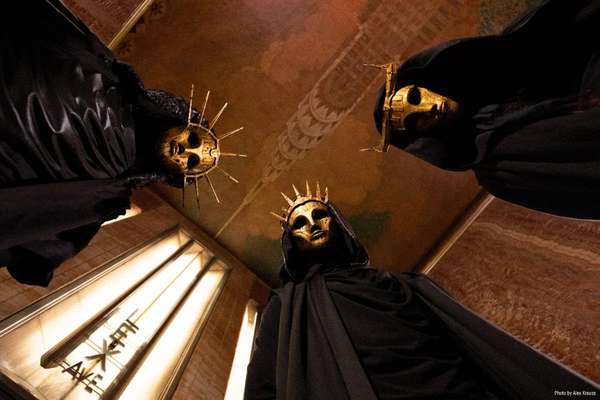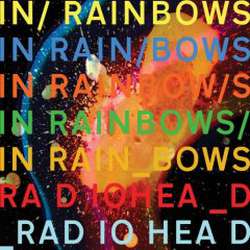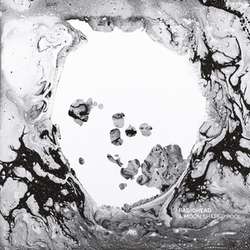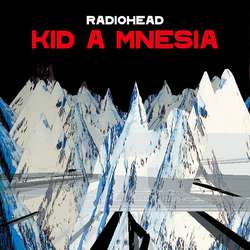Thom Yorke had billed this record as OK Computer 2, and Radiohead's cookie doesn't crumble all that different from the motion picture industry, the sequel doesn't live up to the original, but with such an amazing record to live up to, Hail to the Thief has plenty of room left to still be a great record, which it is. The opening track, "2+2=5" lures you in with a calm, enticing melody, then acts as the old witch and throws your Hansel-y ass in the oven with blaring fury. The record touches on a lot of sounds and styles Radiohead have used in the past, as this record is supposedly 'holding us over' until Radiohead take a yet another sharp turn for the experimental. Even though this isn't really anything extremely new in the world of Radiohead, their sheer creativity and knack for amazing songwriting keep this record strong all through out. The record's lead single, "There There", showcases Radiohead's ability to take their unique sound and admirable creativity and combining it with an amazing pop-sense. The album closes with "A Wolf at the Door", leaving the record on a high note, which it wouldn't be a Radiohead record if it didn't. Radiohead do not dissapoint their fans or the critics, and this record is no exception.
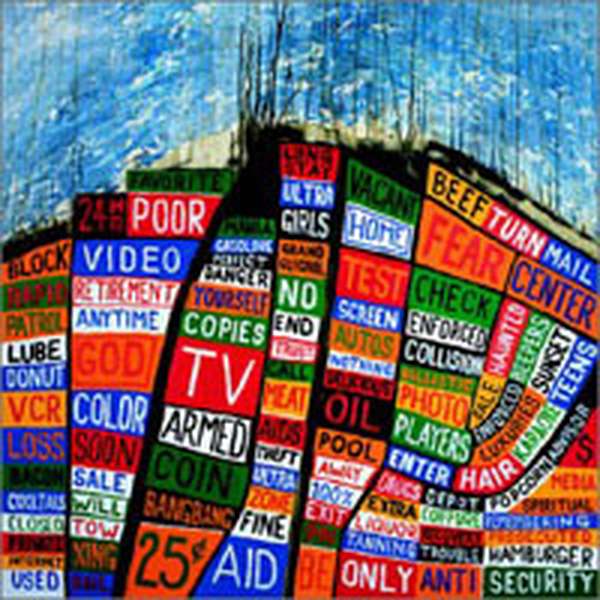
Radiohead are one of those bands that people go out of their way to like because there's quite a bit to like about them. Some would even certify Radiohead as a capital-G capital-B "Great Band," and I'm one of them. But even the greatest bands in the world make a few mistakes every now and then. Radiohead's is more of a small trot down the path toward career destruction, just a few small steps after which a hasty retreat was enacted, nothing compared to the epic journay down it which some bands have taken recently (St. Anger, anyone?). Simply put, this record is filled with a lot of ideas, some of which criminally go nowhere, which is not something the band has done often in the past. Half the time, the songs are less than songs go absolutely nowhere, and this is where Hail to the Thief differentiates from its peers. Yes, Amnesiac had its fair share of missteps, but thankfully, with the exception of "Pulk/Pull Revolving Doors," they were countered by having a larger, better idea around them, or being so short as to not even merit attention. Like previous albums, the best moments of Hail to the Thief are simply exhilirating. "2+2=5" is possibly the best opening song this year, containing epic building and crashing guitars, along with Thom Yorke going insane behind a microphone, recalling the finer moments of Mogwai's "Ten Rapid", "Paranoid Android," and the Smiths, as jangling guitars fight each other. "Sit Down. Stand Up" sounds like "Idioteque"'s older brother, a little more mature, a little world-wearier, and a little sneakier; Yorke isn't yelling at you anymore with gun's blazing, he's sneaking up behind you with a dagger pointed at your jugular. However, it's the not-so-good moments which stick outward in my mind. After "Sit Down. Stand Up," the record's rather unengaging middle begins, and it's where things fall apart. "Sail to the Moon" and "Backdrifts" are nothing we haven't heard before, and sound like a pair of Amnesiac throwaways, the former being a gentle piano ballad, the latter being this record's first absolutely boring song. "Go to Sleep" sounds like a miniature "Paranoid Android," which makes me think that maybe the band didn't understand what made that song so great was its pretentious bombast and overdrawn segments. "Where I End and You Begin" really wishes it was U2, and in wishing it was, comes nowhere near the anthem it so wants to be. "We Suck Young Blood" is made up almost entirely of piano, percussion, and handclaps, which, though they try, can't cover up the fact that there isn't much of a song there. "The Gloaming" is another experiment in IDM that falls flat, after which I said "The next on this record better be fucking great, or it's being turned off," which is when "There There" kicks in, which, while falling apart a little bit at its back-end, has a heartbreaking chorus made even more effective by the pounding tom-toms pushing the song forward. "I Will" comes and goes so fast that it's barely even there, and quickly gives way to the almost jovial "A Punch-Up at a Wedding," a strange amalgam of electronic drums, vintage R&B bass, and piano, as well as one of the records strongest hooks in the chorus. "Myxomatosis" is a dense sound-collage of mostly electronics and sampled drums, along with the lyrics from "Cuttooth" being sung again in an equally effective fashion. "Scatterbrain" is another unsettling song of notes and strange lyrics that looks forward without really recalling any of the band's previous work. "A Wolf at the Door" closes the record on a high-note, as every Radiohead record does, succintly wrapping up everything great about the record in one song. So there you have it, an album half-comprised of fantastic songs, half-comprised of clunkers. Ultimately, the good ends up outweighing the bad, but I never expected Radiohead to have that happen with such a slim margin. What's most infuriating is that the half of this record that's comprised of less than great songs could have been replaced by, oh, I don't know, let's just randomly say "Follow Me Around," "Big Boots," "Big Ideas (Don't Get Any)," "Lift," "I Promise," "Reckoner," "Wicked Child," maybe even a studio version of "True Love Waits." Instead, we've been given half-ideas and a less than compelling record. It's equal parts frustrating and amazing, which, while it's resulted in genius for the band before, has delivered a far from stellar record this time around. With all this hailing to the thief, maybe we should direct our admiration towards Radiohead once again, because I certainly feel like I've been robbed.

